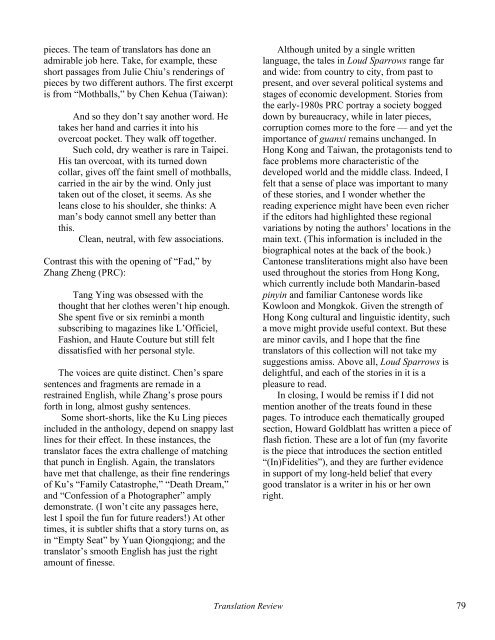Translation Review - The University of Texas at Dallas
Translation Review - The University of Texas at Dallas
Translation Review - The University of Texas at Dallas
Create successful ePaper yourself
Turn your PDF publications into a flip-book with our unique Google optimized e-Paper software.
pieces. <strong>The</strong> team <strong>of</strong> transl<strong>at</strong>ors has done an<br />
admirable job here. Take, for example, these<br />
short passages from Julie Chiu’s renderings <strong>of</strong><br />
pieces by two different authors. <strong>The</strong> first excerpt<br />
is from “Mothballs,” by Chen Kehua (Taiwan):<br />
And so they don’t say another word. He<br />
takes her hand and carries it into his<br />
overco<strong>at</strong> pocket. <strong>The</strong>y walk <strong>of</strong>f together.<br />
Such cold, dry we<strong>at</strong>her is rare in Taipei.<br />
His tan overco<strong>at</strong>, with its turned down<br />
collar, gives <strong>of</strong>f the faint smell <strong>of</strong> mothballs,<br />
carried in the air by the wind. Only just<br />
taken out <strong>of</strong> the closet, it seems. As she<br />
leans close to his shoulder, she thinks: A<br />
man’s body cannot smell any better than<br />
this.<br />
Clean, neutral, with few associ<strong>at</strong>ions.<br />
Contrast this with the opening <strong>of</strong> “Fad,” by<br />
Zhang Zheng (PRC):<br />
Tang Ying was obsessed with the<br />
thought th<strong>at</strong> her clothes weren’t hip enough.<br />
She spent five or six reminbi a month<br />
subscribing to magazines like L’Officiel,<br />
Fashion, and Haute Couture but still felt<br />
diss<strong>at</strong>isfied with her personal style.<br />
<strong>The</strong> voices are quite distinct. Chen’s spare<br />
sentences and fragments are remade in a<br />
restrained English, while Zhang’s prose pours<br />
forth in long, almost gushy sentences.<br />
Some short-shorts, like the Ku Ling pieces<br />
included in the anthology, depend on snappy last<br />
lines for their effect. In these instances, the<br />
transl<strong>at</strong>or faces the extra challenge <strong>of</strong> m<strong>at</strong>ching<br />
th<strong>at</strong> punch in English. Again, the transl<strong>at</strong>ors<br />
have met th<strong>at</strong> challenge, as their fine renderings<br />
<strong>of</strong> Ku’s “Family C<strong>at</strong>astrophe,” “De<strong>at</strong>h Dream,”<br />
and “Confession <strong>of</strong> a Photographer” amply<br />
demonstr<strong>at</strong>e. (I won’t cite any passages here,<br />
lest I spoil the fun for future readers!) At other<br />
times, it is subtler shifts th<strong>at</strong> a story turns on, as<br />
in “Empty Se<strong>at</strong>” by Yuan Qiongqiong; and the<br />
transl<strong>at</strong>or’s smooth English has just the right<br />
amount <strong>of</strong> finesse.<br />
Although united by a single written<br />
language, the tales in Loud Sparrows range far<br />
and wide: from country to city, from past to<br />
present, and over several political systems and<br />
stages <strong>of</strong> economic development. Stories from<br />
the early-1980s PRC portray a society bogged<br />
down by bureaucracy, while in l<strong>at</strong>er pieces,<br />
corruption comes more to the fore — and yet the<br />
importance <strong>of</strong> guanxi remains unchanged. In<br />
Hong Kong and Taiwan, the protagonists tend to<br />
face problems more characteristic <strong>of</strong> the<br />
developed world and the middle class. Indeed, I<br />
felt th<strong>at</strong> a sense <strong>of</strong> place was important to many<br />
<strong>of</strong> these stories, and I wonder whether the<br />
reading experience might have been even richer<br />
if the editors had highlighted these regional<br />
vari<strong>at</strong>ions by noting the authors’ loc<strong>at</strong>ions in the<br />
main text. (This inform<strong>at</strong>ion is included in the<br />
biographical notes <strong>at</strong> the back <strong>of</strong> the book.)<br />
Cantonese transliter<strong>at</strong>ions might also have been<br />
used throughout the stories from Hong Kong,<br />
which currently include both Mandarin-based<br />
pinyin and familiar Cantonese words like<br />
Kowloon and Mongkok. Given the strength <strong>of</strong><br />
Hong Kong cultural and linguistic identity, such<br />
a move might provide useful context. But these<br />
are minor cavils, and I hope th<strong>at</strong> the fine<br />
transl<strong>at</strong>ors <strong>of</strong> this collection will not take my<br />
suggestions amiss. Above all, Loud Sparrows is<br />
delightful, and each <strong>of</strong> the stories in it is a<br />
pleasure to read.<br />
In closing, I would be remiss if I did not<br />
mention another <strong>of</strong> the tre<strong>at</strong>s found in these<br />
pages. To introduce each them<strong>at</strong>ically grouped<br />
section, Howard Goldbl<strong>at</strong>t has written a piece <strong>of</strong><br />
flash fiction. <strong>The</strong>se are a lot <strong>of</strong> fun (my favorite<br />
is the piece th<strong>at</strong> introduces the section entitled<br />
“(In)Fidelities”), and they are further evidence<br />
in support <strong>of</strong> my long-held belief th<strong>at</strong> every<br />
good transl<strong>at</strong>or is a writer in his or her own<br />
right.<br />
<strong>Transl<strong>at</strong>ion</strong> <strong>Review</strong> 79

















